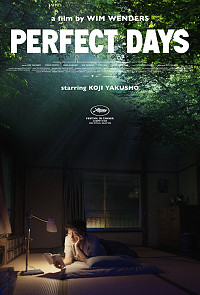| SHADOWS ON THE WALL | REVIEWS | NEWS | FESTIVAL | AWARDS | Q&A | ABOUT | TALKBACK | |||||||||||||||||||||
 Shadows off the beaten path Shadows off the beaten pathIndies, foreign, docs and shorts...
On this page:
EUREKA |
PERFECT DAYS |
THE SETTLERS
| |||||||||||||||||||||
| See also: SHADOWS FILM FESTIVAL | Last update 9.Feb.24 | |||||||||||||||||||||
|
Eureka Review by Rich Cline | 
| |||||||||||||||||||||
 dir Lisandro Alonso prd Marianne Slot, Carine Leblanc scr Lisandro Alonso, Fabian Casas, Martin Camano with Viggo Mortensen, Chiara Mastroianni, Alaina Clifford, Sadie Lapointe, Viilbjork Malling Agger, Adanilo, Marcio Marante, Luisa Cruz, Rafi Pitts, Luisa Cruz, Ta-Yamni Long Black Cat, Liliana Alavez release US Oct.23 nyff, UK 16.Feb.24 23/Argentina 2h27 CANNES FILM FEST Is it streaming? |
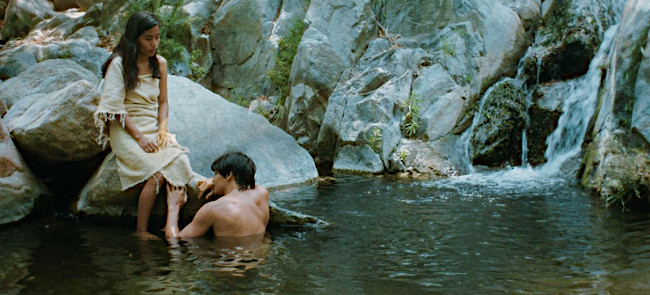 Deliberately elusive, this meandering epic tells three stories involving indigenous people in distinctly different situations, seemingly inter-connected by a curious marabou stork. Argentine filmmaker Lisandro Alonso pokes and prods at big issues while playing with various movie genres, adding touches of comedy, adventure and suspense along the way. Trying to work out precisely what it means is pointless. It's easier to just give into the Lynchian vibe. In America's Wild West, gunslinger Murphy (Mortensen) strolls into a dusty town searching for his daughter, challenging the local sheriff (Mastroianni). He's more than willing to take out anyone who stands in his way. Watching this on TV in present-day South Dakota, police officer Alaina (Clifford) encounters a range of messy situations as she patrols the Lakota lands. Meanwhile, her basketball coach daughter Sadie (Lapointe) is having a crisis of identity. And in 1970s Brazil, forest dwellers share their dreams, which leads to a conflict that sends one young man to find a new life. Each section is shot in a different style, from the rather camp, black and white, square-framed Western to the Fargo-style spiralling police procedural, then transitioning to a naturalistic, dreamy woodland gold-rush odyssey. Pacing throughout is relaxed to the point where the film seems to sputter to a stop every now and then. But this helps ground the more fantastical elements in real life details, augmented nicely by a range of earthy characters who appear to be performed by non-actors. Indeed, these people feel often bracingly authentic. The most vivid role goes to Clifford, as Alaina simply tries to do her everyday job with very little support from dispatch and a seemingly endless series of problems to deal with in her community. Lapointe also gets a chance to deepen her character, a young woman who understands the challenges of living in this place and time, connecting with people around her on meaningful levels. Sadie's grandfather reminds her that life is about space, not time, which feeds into the film's generally confusing themes. But then Alonso isn't interested in explaining things for the viewer, leaving loose threads dangling everywhere while playfully invoking magical realism as this enormous stork prowls through scenes that continually connect the characters to both the earth and human nature. It's a heady, overlong mix that never quite comes into focus. But it provokes some big feelings.
| ||||||||||||||||||||
|
Perfect Days Review by Rich Cline |  MUST
MUST  SEE SEE
CANNES FILM FEST TORONTO FILM FEST   Is it streaming?
| 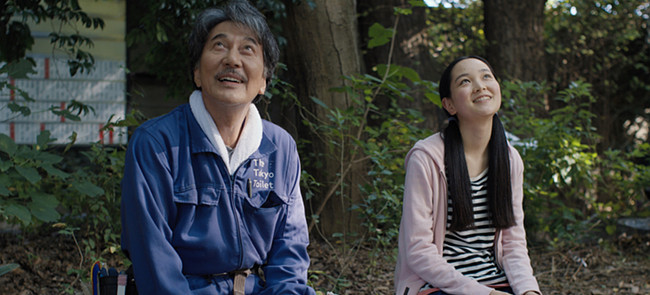 Quietly observational, this film is a celebration of simple pleasures, honing in on a fundamental public service performed with focus and dedication. German filmmaker Wim Wenders takes an intimate approach that quickly draws us in. Drawing the title from the Lou Reed classic, the film is deeply woven with irony, using the worst imaginable job to depict an idyllic life, then inventively unpicking it to reveal something deeper. In Tokyo, middle-aged Hirayama (Yakusho) is happy in his stress-free life cleaning the city's many public toilets, listening to vintage American rock as he drives between locations. Along the way, he also silently helps various people, including his talkative colleague Takashi (Emoto), who is always up to something. Then one day, Hirayama's teen niece Niko (Nakano) turns up, having run away from home and intending to stay with him. He doesn't mind, except that it raises issues from his family that he'd rather not deal with. Then Takashi abruptly quits, leaving Hirayama with double shifts. Micro adventures punctuate Hirayama's days, such as helping an overwhelmed young child, replanting a tiny sprouting tree or leaving notes to play tic-tac-toe with an unseen stranger. He shoots photos on film and reads books to fall asleep, then his dreams are rendered in a swirl of black and white imagery. There are jagged bursts of subtle wit in almost every scene, finding humour and emotion in a range of situations that are more than they appear to be. The excellent Yakusho finds vivid textures in this man who simply refuses to get involved in even low-key conflicts. His open-handed approach to everyone he meets is wonderfully refreshing, sparking a series of amusing encounters. It's a beautiful, finely tuned performance that constantly reveals secrets, including several points at which we can identify with Hirayama. And everyone in the terrific supporting cast has a surprise of his or her own. Without any back story, it's easy to see Hirayama's smiley attitude as pure contentment. But there are hints and layers in his reactions, and the songs cleverly offer glimpses into his feelings. While much of the film is dialog-free, each scene has something to say about modern life, progress and values. And it continually offers us with hints about how to make our mundane day-to-day existence have meaning, even if there are things that haunt us.
|
| The Settlers Los Colonos Review by Rich Cline | 
| 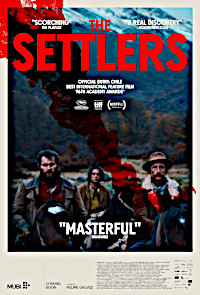 dir Felipe Galvez scr Antonia Girardi, Felipe Galvez prd Stefano Centini, Emily Morgan, Thierry Lenouvel, Matias Roveda, Santiago Gallelli with Camilo Arancibia, Mark Stanley, Benjamin Westfall, Marcelo Alonso, Alfredo Castro, Sam Spruell, Mishell Guana, Mariano Llinas, Adriana Stuven, Luis Machin, Agustin Rittano, Heinz K Krattiger release US 12.Jan.24, UK 9.Feb.24 23/Chile 1h37 CANNES FILM FEST TORONTO FILM FEST   Is it streaming?
| 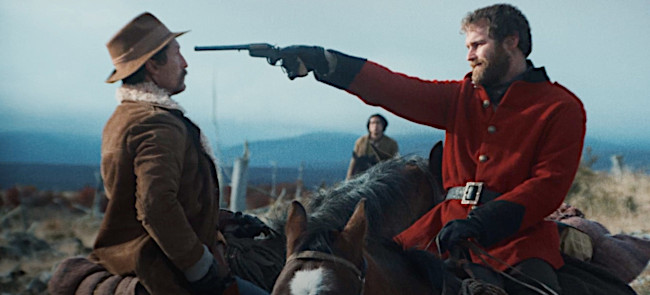 South American cinema is growing bolder about facing the lingering impact of colonisation, finding clever ways to grapple with the topic. Here, Chilean filmmaker Felipe Galvez recounts an early 20th century odyssey that explores collisions between Europeans and indigenous people in often hard-to-watch ways. The film is thoughtful and challenging, with a somewhat enigmatic structure. Atrocities and injustice litter the screen, both underscored and softened by the nuanced storytelling. In 1901 Tierra del Fuego, Spanish Don Jose (Castro) owns land from Chile's Pacific coast to Argentina's Atlantic, assigning Scottish lieutenant MacLennan (Stanley) to open a path to transfer sheep to the east. MacLennon chooses talented indigenous youngster Segundo (Arancibia) to assist him, while Jose insists he also takes American cowboy Bill (Westfall). Segundo knows to bite his tongue about Bill and MacLennon's scorched-earth approach. Then they reach Colonel Martin (Spruell), and the dynamic shifts. Seven years later, Vicuna (Alonso) is documenting his violent history and visits both Jose and Segundo to get the truth. Spectacularly shot under big skies, the film captures a terrific sense of the Wild West lifestyle in this place, echoed in the presence of an American who has transplanted his fear and loathing of indigenous people to this new place. Europeans sneer at the "savages" while recognising their skills, intelligence and, in a couple of squirm-inducing sequences, beauty. But they don't hesitate to slaughter peaceful families. Locals watch this in silent horror, understanding their powerlessness. But their resistance takes unexpected routes. All of this is depicted with subtlety and skill by the cast and crew. Actors create almost unnervingly realistic characters, never flinching from the worst attitudes and actions. This adds an almost relentless bleakness to the film that's only undermined by Segundo's observant eyes. Arancibia gives the film a pounding heart, a man who knows what is going on and tentatively challenges it. The complex, nuanced Stanley and swaggering Westfall are terrific as his travelling companions. And strong kicks are provided buy the superb Alonso, Spruell and Castro in meaty side roles. The offbeat storytelling may be too mannered for mainstream audiences, while several violent sequences are downright horrific. The film also requires some knowledge of Latin American politics at a time when Chileans were celebrating their nation's first century while ignoring centuries of history that went before. Galvez is a gifted director who creates wonderful cinematic textures while nodding to film history and the grim truth about how the so-called "New World" was established. It's uneven but often dazzling, and ultimately heart-stopping in its silent resilience.
| 
See also: SHADOWS FILM FESTIVAL © 2024 by Rich Cline, Shadows
on the Wall
HOME | REVIEWS | NEWS | FESTIVAL | AWARDS
| Q&A | ABOUT | TALKBACK | | ||||||||||||||

